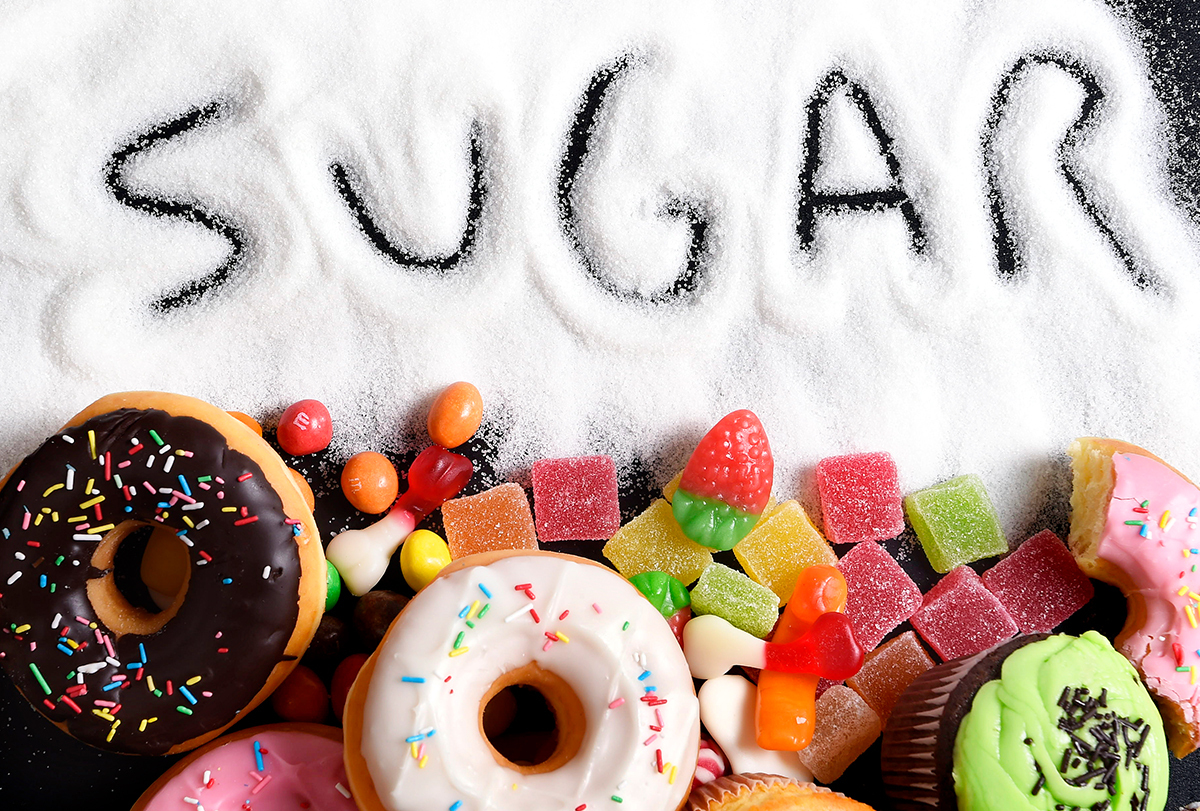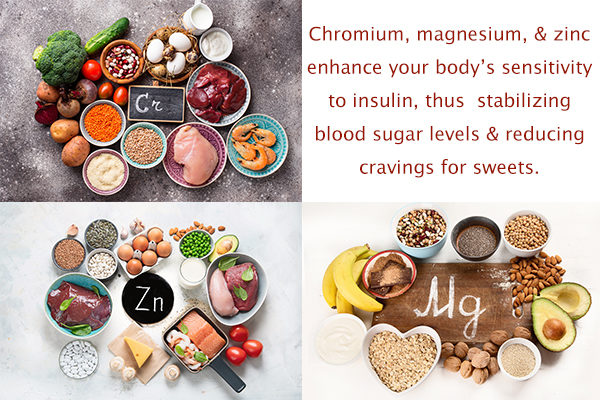In this article:
Most people have a heightened preference for sweet taste – it is in their genetic makeup, it ensures survival, and it is the first taste they are exposed to when they are born, through their mothers’ milk.

However, some people claim that they are addicted to sugar and that their desire for sweets is so strong it is almost impossible to overcome.
What Is Sugar Addiction?
Sugar addiction, or food addiction in general, is not an official diagnosis. It is a term people use to describe an overwhelming liking of everything, or almost everything, sweet.
The consumption of sweet foods elicits a response in the brain, similar to what common recreational drugs do. (1) However, eating many non-sweet foods or fruits essentially does the same, without being regarded as addictive behavior.
Most sugar-addictive behaviors are conditioned by the overconsumption of sweetened or sugary-fatty food rather than raw sugar, and you need more and more sweets to satisfy your cravings. This is because the amount of feel-good hormones released in response to the same amount of substance (sweets) is progressively reduced, which is known as desensitization.
Unlike illicit drugs, it’s hard to do away with sugary products as the majority of the processed foods flooding the market contain lots of sugar or high-fructose corn syrup.
However, you have to make a clear distinction between real food for survival (whole, unprocessed, fresh food) and food-like items – the highly processed stuff – which you do not need. The latter should be consumed mindfully, in moderation, and with caution.
So, how do you beat sugar addiction or sweet cravings in general?
Ways to Beat Your Sugar Addiction
The following measures can help control your sugar cravings in general.
1. Set clear boundaries with sugar
Willpower is not what you need to set clear boundaries with certain foods. It is practicing self-respect and self-care.
Put yourself in control. Do not let sugar navigate your ship – your body is yours to live in and you need a healthy, resilient one to ensure a long, happy life.
Excess sugar contributes to oxidative stress in your body, leading to inflammation. In turn, inflammation causes chronic diseases, (2) including type two diabetes, heart disease, (3) cancer, (4) obesity, neuropathy, and dementia.
Put your mind to it and make an agreement with yourself that you will minimize processed and sweetened foods. But do not just focus on taking stuff out of your diet; focus on adding stuff in.
2. Eat more fresh fruit
Fruits are naturally sweet, offer a variety of potent nutrients and antioxidants, are full of fiber and water to fill you up, and are rich in flavor. Start with adding a serving of fruit to every meal, and you may find yourself craving less sugar.
Fruits were found to have anti-obesity effects in many studies (5) through known mechanisms, including improved satiety, reduction of sugar cravings, gut flora modulation, and effects on hunger and satiety hormones.
Some mechanisms are still being researched, and scientists believe they might lie in nutrigenomics – the ways genes are being turned on or off through the diet. (6)
By adding more fruit instead of taking foods out of your diet, psychologically, it will be easier to deal with dietary changes. Inadvertently, at the end of the day, you are eating less since the volume of food increases.
3. Eat foods high in chromium, magnesium, and zinc

Chromium, magnesium, and zinc enhance your body’s sensitivity to insulin, thus stabilizing blood sugar levels and reducing cravings for sweets. They are also abundant in whole, unprocessed foods, which should comprise the bulk of your diet.
Here are the common sources of these minerals:
- Chromium-rich foods: Apples, bananas, broccoli, bran cereal, whole grains, wheat germ, oranges, romaine lettuce, raw onions, potatoes, green beans, raw tomatoes, black pepper, grape juice
- Magnesium-rich foods: Nuts and seeds, green leafy vegetables, figs, avocado, raspberries, legumes, vegetables, seafood, whole grains, raw cacao, dark chocolate, tofu, chlorella powder
- Zinc-rich foods: Oysters, beef, lamb, spinach, pumpkin seeds, nuts, dark chocolate, pork, chicken, beans, mushrooms
4. Out of sight, out of mind
One study found that “making snacks less accessible by putting them further away is a potentially effective strategy to decrease snack intake, without risk of compensatory behavior.” (7)
However, do not throw food away, even junk food. You can load a box and donate it to a homeless shelter, or simply pass by an area where homeless people are. You will declutter your diet and feed someone in need.
5. Snooze and de-stress
Your sleep and stress levels affect your hormones and appetite. (8) Chronically sleep-deprived people, like those working night shifts, tend to have lower metabolic rates, heightened appetites, and sugar cravings. They often replenish their low energy from lack of sleep with fast-acting sugar boosts from candy, soda, and sweetened coffee.
Layer sleep deprivation with high-stress levels and you’ve got a perfect hormone storm! So, get adequate sleep of 7–8 hours every night. Find ways to reduce stress, such as practicing mindfulness, meditating, taking walks, spending quiet time, and doing your favorite activities, to reset and calm your brain.
Expert Answers (Q&A)
Answered by Olivia DiPio, RDN

Calcium, zinc, magnesium, and chromium deficiencies are known to cause cravings. An example would be women’s time of the month.
The body needs an excess of these nutrients, so cravings for food items such as chocolate occur. Dark chocolate is rich in magnesium and calcium, which would curb the craving. (9)(10)
No, blood sugar levels do not cause sugar cravings. Most individuals do not experience severe low blood sugar. Those who usually experience low blood sugar are people with type 2 diabetes.
These individuals need to make sure that they are feeding their body continuously with healthy foods to maintain normal blood sugar levels. In those without diabetes, the body is able to rebound from high-volume intakes or lack of intake to maintain homeostasis.
There is no such thing as a “sugar craving habit.” There are, on the other hand, healthier lifestyle choices. For example, some people consider a sugar craving as going down to the vending machine and grabbing a soda with a candy bar every day at 2 pm. However, it is not – it is a habit.
Another person could have seltzer and a bag of veggies every day. This, again, is a habit. There is no time period of stopping the sugar habit.
Some individuals can change from eating junk food every day to being a vegan cold turkey. Others take weeks just to stop eating a late-night snack.
So, instead of stopping a bad sugar habit, I would suggest creating healthy habits. Then, if you really want that candy bar or cream soda, you are able to treat yourself without any shame or guilt.
Experts are still divided on their opinion about sugar addiction. Some say sugar or sweet eating habits are similar to addiction and craving.
A 2018 review paper revealed strong evidence that sugar addiction exists, both at the preclinical and clinical levels. (11) However, evidence to back this claim is not sufficient. (12)
This is a tricky question because, in the media, sugar is very demonized. For example, the ketogenic diet restricts sugar consumption. I would not suggest stopping sugar completely because I believe that a balanced diet is important for both the body and mind.
Beware of added sugars, though! The daily recommendation for women for added sugar is 25 g and for men 35 g. To put things into perspective, one bottle of soda contains around 55 g of added sugar.
Added sugar is commonly found in dressings, candies, sodas, fancy coffees, sauces, and frozen meals. Then there is another type of sugar that is naturally occurring, such as in fruit. There is no standard amount of natural sugar that you should take in a day.
Your body needs natural sugar to survive and hence it is found in awesome foods such as starchy vegetables and fruits. The takeaway is to be aware of what you are consuming and start reading labels.
No medical conditions increase sugar cravings. There are medications such as steroids that may increase overall appetite, but not specifically sugar.
Everyone has a different preference when it comes to sugar. My personal two preferences would be monk fruit and stevia. They are both naturally occurring.
Something to remember is just because you are using the “better choice” does not mean you should disregard portion control. For example, if you make a homemade cake and use stevia, which happens to be zero calories, it does not mean you should eat the entire pan.
If you are looking for a sugar substitute, then I would suggest you ask yourself a few questions:
• How many calories are in it?
• Is it natural?
• Why am I using a substitute?
There is no hard evidence that your body responds better to a substitute than to regular sugar.
• Create daily healthy habits.
• Keep your added sugars down – read labels!
• Allow yourself to have a “craving” but stick with portion control.
Final Word
Having a written plan for your goals – whether professional, personal, or health-related ones – is an important step toward achieving them, and practice makes progress.
Do not expect to be perfect; that is not realistic and may set you up for failure and loss of motivation. Do expect changes and improvements, track them, celebrate (without cupcakes), and keep going until you are, not sugar, in control.
- Was this article helpful?
- YES, THANKS!NOT REALLY


